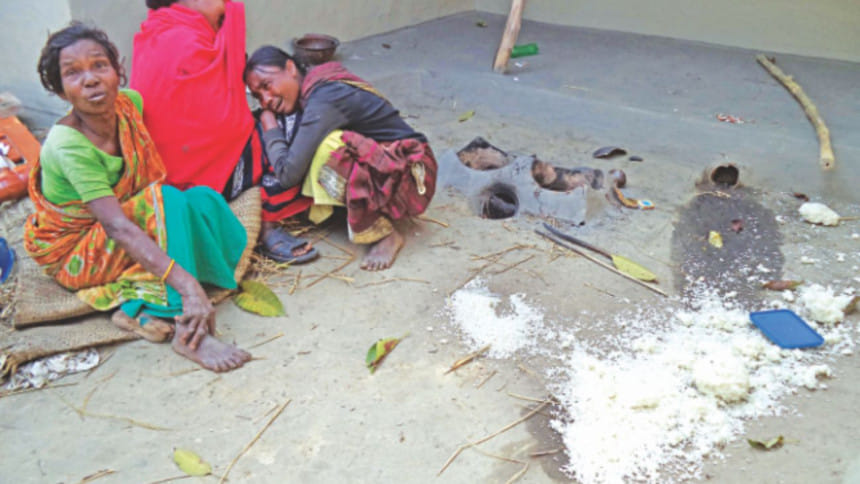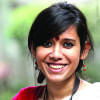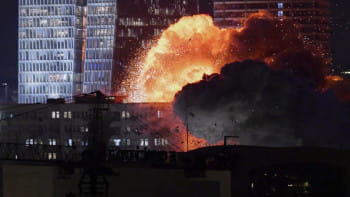LAND IS PRICELESS ADIVASI LIVES ARE NOT

Purti Munda, the forefather of Mahasweta Devi's adivasi hero, Chotti Munda, had lamented how, wherever he goes, however remote the place, someone appears right away – "Whites-Bangalis-Biharis" – to snatch away his land, and along with it, his peace of mind. He had bemoaned how, every time, he is evicted from his home and in its stead, a big settlement grows, causing his Mundari world to shrink and shrink till it is no more. He had wondered why he couldn't ever get what he wanted – a small village, a place to call home.
I take a close look at the Santal elder sitting near me, and wonder if this is how Purti Munda, burdened with age and a lifetime of bitter experiences, would have looked like. He certainly sounds like him, as he recalls three generations of oppressive rule for his people. "I've lived through British rule, Pakistani rule and the rule of the Bangalis in free and independent Bangladesh. I've lived through many promises of freedom, but I am yet to know what it tastes like," regrets the grandfather of three from Dhanjuri village in Dinajpur. "None of them cared about us, only our land, which they took, over decades, under the patronage of successive governments."
He was an affluent farmer once, he says, with land he could call his own, and a family he could feed, before it was snatched away him from, piece by piece, by influential land grabbers. Now, with his only son, a day labourer, earning meagre wages that is barely enough to feed his family of five, he doesn't know where his next meal would come from. "It's not only that they stripped me off my land," he says, "they stripped me off my dignity."
For the millions of adivasis living in Bangladesh, be it in the hill tracts or on the plains, land grabbing and forced dispossessions have become everyday realities. The stories of eviction, especially in the plain lands, are disturbingly similar. You may have lived on a piece of ancestral land or khas land since your birth, but one day, your Bangali neighbour comes and tells you it's his land. You protest indignantly, but your cries fall on deaf ears as, more often than not, your neighbour has the means to obtain documents from the Land Office to "prove" his claims. You go to the police, the elected representatives, lawyers and influential people in your locale to plead your case, but they smirk at you, dismissively. When you refuse to move out of your home, your neighbour comes to give you a "grand farewell" with a bunch of goons, destroying your home, and beating you and your family. If you still refuse to accept your fate in silence, false cases are filed against you, and when it's your word against that of the privileged Bangali, there's only one way the tide of justice can run.
But this is the case if you're lucky. If you're not, your whole village may be wiped out, like it was earlier this year at a Santal village in Parbatipur, after a fight broke out between the Santals and Bangali land grabbers when the latter wanted to forcibly occupy the former's cultivable lands. A Bangali man was killed with an arrow fired in self-defence (as ruled by a parliamentary caucus after the incident) during the clash; subsequently, after 19 men had already been arrested by law enforcers for this killing, several thousand Bangalis attacked the Santal village and burnt down their houses, abused women and girls, destroyed all property, uprooted tube-wells and looted food grains, cattle, etc. No action, of course, has yet been taken against the Bangalis who launched this communal attack. Although a case has been filed, the villagers of Chirakutpara preserve no hope of ever getting justice for the violence unleashed upon them.
But this too is the case if you're lucky. If you're not, you may be shot or stabbed to death in the middle of the day for daring to defy. In Kachua village in Nawabganj, three members of a single adivasi family have been killed by land grabbers since 1975 – father, Fagu Soren in 1975, elder brother, Gosai Soren in 2011, and younger brother, Dudu Soren in 2014. Land grabbers had seized 33 acres of land when the family took refuge at a camp in India during the Liberation War and made false documents to substantiate their claim. Dudu had once said, refusing to give up the legal fight for the land, "I will give my life, but won't leave the land for which my father died. I will also die, but won't leave our land." And so, like hundreds of adivasis like him who die in land-related disputes, he met his "fate" – for land is priceless, but adivasi lives are not.
In the land of the Bangalis, adivasis know better than to hope for justice – for their land, or for their lives. Law enforcers, justice system, elected representatives, government officials, local politicians – all serve the interests of the Bangali land grabbers. Even censuses and land surveys are up for sale, with those with money and power able to buy themselves a place on the map with incredible ease.
The plain land adivasis have long demanded that a Land Commission be formed; but despite assurances from the Awami League in its election manifesto(s) that a Land Commission will be formed in its tenure, no initiative has been taken in the last six and a half years to address land-related concerns of the adivasis in the plain land.
There is no denying that we have a terrible record of protecting our minority populations, especially when their land is at stake. In fact, over the years, we, the privileged majority, seem to have gotten quite good at driving people off their lands, having honed our skills from decades of grabbing vested properties of our Hindu population. We have even learnt to fuel communal tension to enable the smooth transfer of land from the minority to the majority. And we have become really good at turning a blind eye towards the oppression of those amongst us who are powerless and marginalised.
The writer is an activist and journalist.

 For all latest news, follow The Daily Star's Google News channel.
For all latest news, follow The Daily Star's Google News channel. 



Comments